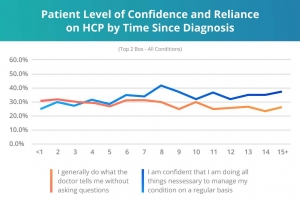
The ‘Voice of Experience’ May Help Foster Confidence in People Facing New Autoimmune Diagnosis
When a person is newly diagnosed with an autoimmune condition, such as psoriasis or rheumatoid arthritis, it’s not uncommon for us to hear from them in our online health communities discussing fear or uncertainty, and seeking connection or support. The myriad of difficult decisions they are making around treatment options may foster a sense of self-doubt, and the newly diagnosed person may feel overwhelmed by decision fatigue. How can the healthcare industry better reach newly diagnosed patients and help build confidence in their own decision making?
Recent survey data from Health Union revealed interesting insights into the attitudes and behaviors of 8,289 people diagnosed with various autoimmune conditions.* Since 2010, our syndicated In America surveys have captured patient-reported health data from tens of thousands of people living with chronic health conditions (and their care partners), so we can better support them in our online communities and connect pharma with critical perspectives it may be missing. In this specific analysis, the data showed that patients diagnosed less than two years ago report being less active in treatment decisions, as well as being less confident in their condition management. Additionally, patients diagnosed less than two years ago were more likely to say they generally do what the doctor tells them without asking questions.**
Interestingly, people diagnosed with autoimmune conditions report low levels of confidence throughout their years living with the diagnosis–the chart below shows confidence peaking at just 40% around year eight.
In an effort to help provide deeper insight into what newly diagnosed patients want or need, we wanted to know: If a person feels more confident in managing their condition, are they less reliant on their doctor to tell them what to do without asking questions?
 In the chart to the left, we charted two survey responses across years of diagnosis: “I generally do what the doctor tells me without asking questions” and “I am confident that I am doing all things necessary to manage my condition on a regular basis.” The survey data reveals that those very newly diagnosed (less than one year) had the lowest confidence and the largest inverse relationship of confidence/HCP reliance. With this new diagnosis, they are reporting low levels of confidence and a heavy reliance on their doctor.
In the chart to the left, we charted two survey responses across years of diagnosis: “I generally do what the doctor tells me without asking questions” and “I am confident that I am doing all things necessary to manage my condition on a regular basis.” The survey data reveals that those very newly diagnosed (less than one year) had the lowest confidence and the largest inverse relationship of confidence/HCP reliance. With this new diagnosis, they are reporting low levels of confidence and a heavy reliance on their doctor.
Between years three and four post-diagnosis, we see the relationship begins to cross over. As the person gains more experience with their condition and treatment, the less they come to rely solely on their HCP and/or the more they advocate for themselves and ask questions.
In a time when people have so many treatment options and information sources, how can pharma help increase overall confidence levels throughout the patient journey? More specifically, how can the industry foster confidence in those newly diagnosed patients making their first treatment decisions?
The survey data shows that those who are newly diagnosed with autoimmune conditions are more likely to use friends or family members with the condition to learn about or manage their health, in addition to using online resources to educate themselves. If a person’s experience living with the condition and self-advocacy are correlated, pharma may consider the benefit of connecting newly diagnosed patients with more experienced patients to help accelerate those feelings of confidence. In addition to offering “questions to ask your doctor,” data suggests people are in need of advice from people who have been through this before, such as “questions I wish I had asked when I was newly diagnosed.”
It is increasingly critical for marketers to consider when and how to meet people where they are–particularly during those weeks and months following a diagnosis. Perhaps more importantly, it’s necessary to recognize that in their search for information, people are often seeking connection with other patients and validation for their experiences in addition to resources that may help them make difficult decisions.
Health Union’s approach to cultivating growing online health communities helps industry partners uncover and address the drivers and barriers to adoption, persistence, adherence, and overall decision making. This approach enables marketers to:
- Integrate qualitative and quantitative insights–to understand people’s wants and needs so you can focus on reaching patients in the right places and at the right moment in time.
- Participate directly in conversations through custom media opportunities–enabling you to efficiently attract and engage the right audiences.
- Participate indirectly by targeting media placements around content that’s most relevant to the person, ensuring a broad reach beyond social and community platforms.
Health Union can help you create smarter, more effective programs for patients: visit our Business Solutions page for more information.
*Meta-analysis of 2019 In America data: Ankylosing Spondylitis (n=489), Inflammatory Bowel Disease (n=1,705), Psoriatic Arthritis (n=1,148), Psoriasis (n=1,211), and Rheumatoid Arthritis (n=3,736)
**Top 2 box on a 7-point scale
